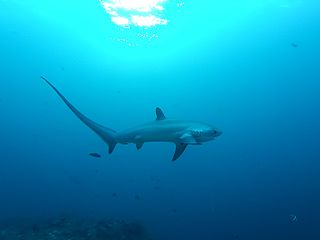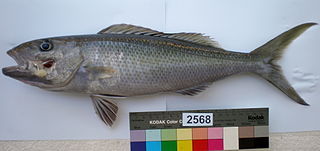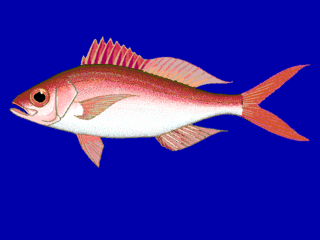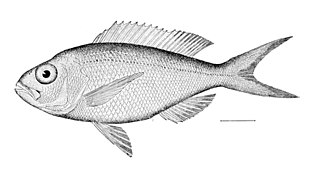
A tuna is a saltwater fish that belongs to the tribe Thunnini, a subgrouping of the Scombridae (mackerel) family. The Thunnini comprise 17 species across five genera, the sizes of which vary greatly, ranging from the bullet tuna up to the Atlantic bluefin tuna, which averages 2 m (6.6 ft) and is believed to live up to 50 years.

Thresher sharks are large mackerel sharks of the family Alopiidae found in all temperate and tropical oceans of the world; the family contains three extant species, all within the genus Alopias.

The northern red snapper is a species of marine ray-finned fish, a snapper belonging to the family Lutjanidae. It is native to the western Atlantic Ocean, the Caribbean Sea, and the Gulf of Mexico, where it inhabits environments associated with reefs. This species is commercially important and is also sought-after as a game fish.

The Priacanthidae, the bigeyes, are a family of 18 species of marine ray-finned fishes. "Catalufa" is an alternate common name for some members of the Priacanthidae. The etymology of the scientific name refers to the family's very rough, spined scales. The common name of "bigeye" refers to the member species' unusually large eyes, suited to their carnivorous and nocturnal lifestyles. Priacanthidae are typically colored bright red, but some have patterns in silver, dusky brown, or black. Most species reach a maximum total length of about 30 cm (12 in), although in a few species lengths of over 50 cm (20 in) are known.

The lane snapper, the Mexican snapper, redtail snapper or spot snapper, is a species of marine ray-finned fish, a snapper belonging to the family Lutjanidae. It is native to the western Atlantic Ocean.

The bigeye tuna is a species of true tuna of the genus Thunnus, belonging to the wider mackerel family Scombridae. In Hawaiian, it is one of two species known as ʻahi, the other being the yellowfin tuna. Bigeye tuna are found in the open waters of all tropical and temperate oceans, but not in the Mediterranean Sea.

The bigeye snapper, also known as the bigeye seaperch, red sea lined snapper, golden striped snapper, rosy snapper, yellow snapper, or simply snapper, is a species of marine ray-finned fish, a snapper belonging to the family Lutjanidae. It is native to the Indian Ocean and the western Pacific Ocean. It is the type species of the genus Lutjanus.

The common bluestripe snapper, bluestripe snapper, bluebanded snapper, bluestripe sea perch, fourline snapper, blue-line snapper or moonlighter, is a species of snapper belonging to the family Lutjanidae. It is native to the Indian Ocean from the coast of Africa and the Red Sea to the central Pacific Ocean. It is commercially important and sought as a game fish. It can also be found in the aquarium trade.

The vermilion snapper, the clubhead snapper, night snapper or beeliner is a species of marine ray-finned fish, a snapper belonging to the family Lutjanidae. It is native to the western Atlantic Ocean.

The popeye catalufa, also known as the bigeye soldierfish, is a species of marine ray-finned fish in the family Priacanthidae, the bigeyes. This fish has an overall dusky orange to red colour with white markings. The dorsal fin appears feathery while rest of fins have black margins. It occurs in the eastern Pacific, where it is found from Oregon to Chile. It occasionally makes its way into the aquarium trade. It grows to a size of 34 centimetres (13 in) in length. This species is nocturnal and shy, preferring deeper waters off islands. It has been recorded associating with squirrelfishes and cardinalfishes but the popeye catalufa goes as deep as 76 metres (249 ft), deeper than its associated species. This species has been recorded from rocky habitats at depths of less than 5 metres (16 ft) to over 100 metres (330 ft). It is a carnivorous species and, when kept in captivity, is known to feed on worms, crustaceans and brittle stars.

Priacanthus meeki is a species of marine ray finned fish, a bigeye in the family Priacanthidae. It is a red fish found in the Hawaiian and Midway Islands. It grows to a size of 33 cm in length. Common names are Hawaiian bigeye in English and ula lau au in the Hawaiian language. It, and other species of its family, may also be called ʻāweoweo in Hawaii.

The green jobfish, also known as the gray jobfish, gray snapper, or slender snapper, and in Hawaiian as uku, is a species of marine ray-finned fish, a snapper belonging to the family Lutjanidae. It is found in the Indo-Pacific region. This species inhabits various reef environments at depths from near the surface to 120 metres (390 ft). It is a very important species for local commercial fisheries and is popular as a game fish, though it has been reported to cause ciguatera poisoning. It can also be found in the aquarium trade. This species is the only known member of its genus.

The bigeye grunt is a species of marine ray-finned fish, a grunt belonging to the family Haemulidae. It is native to the Atlantic coast of Africa.

Pristigenys is a genus of marine ray-finned fish in the family Priacanthidae. It contains five extant species and one extinct species, P. substriata, which is known from fossils found in the Eocene of Monte Bolca, Italy.

Pristigenys niphonia, the Japanese bigeye, is a species of marine ray-finned fish in the family Priacanthidae. It occurs in the western Pacific Ocean.

Lutjanus fulviflamma, the dory snapper, blackspot snapper, black-spot sea perch, finger-mark bream, long-spot snapper, Moses perch or red bream, is a species of marine ray-finned fish belonging to the family Lutjanidae, the snappers. It has a wide Indo-Pacific distribution.

Lutjanus malabaricus, the Malabar blood snapper, saddletail snapper, large-mouthed nannygai, large-mouthed sea-perch, Malabar snapper, nannygai, red bass, red bream, red emperor, red Jew, red snapper, saddletail seaperch, scarlet emperor or scarlet sea-perch, is a species of marine ray-finned fish, a snapper belonging to the family Lutjanidae. It is native to the Indian Ocean and the western Pacific, where it is found east to Fiji and Japan.

The queen snapper, also known as the night snapper or brim snapper, is a species of ray-finned fish, a snapper belonging to the family Lutjanidae. It is native to the western Atlantic Ocean, and is the only species in the genus Etelis found outside the Indo-Pacific region.

Priacanthus arenatus, the toro or Atlantic bigeye, is a species of marine ray finned fish, a bigeye in the family Priacanthidae. Some anglers refer to this fish as "toro snapper", but it is not a snapper, and only distantly related to the fish of the snapper family. It is found across much of the Atlantic Ocean.

Pristipomoides macrophthalmus, the cardinal snapper or bigeye snapper, is a species of ray-finned fish, a snapper belonging to the family Lutjanidae. It is found in the western Atlantic Ocean.





















